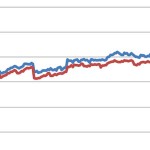The Technocrats’ Deal with the Devil
As one moves about the aisles of Rhode Island governance, as I’ve mentioned before, two overlapping but distinct philosophies begin to emerge: The democratic authoritarians and the technocrats.
Democratic authoritarians are those who believe that a preference for democracy requires us to allow people to go about their business messing up government. Then, when things get out of hand (marked most notably by the inability of their aristocratic peers in both the public and private sectors to continue feeding off the system), they have to step in and set things right. That’s a capability that few believe beyond their grasp. It’s the parents stepping in when the kids are disturbing the neighborhood peace with their play.
The technocrats, by contrast, don’t blame the way things have been operated so much as the system itself. Their faith, therefore, is in the ability of a wise class of leaders to design a system that pulls the society’s variegated incentives toward the most efficient activities. Many of them will cede the floor to the democratic authoritarians for a time, but as with their belief in adjusting the system’s knobs, they believe that dictatorial authority can be deployed as a temporary tool. (It’s long been a topic of discussion on the Western right that this is not likely, even if possible.)
At last week’s House Finance Committee hearing on tax-the-rich legislation, it seemed as if well known local wonk Gary Sasse might be auditioning for the part of archetypal technocrat.
Admitting that he was a supporter of the tax reforms that undulated through the state’s policy mix over the last decade, Sasse said that he now advocates a slight increase in marginal tax rates. He’s analyzed the tax rates of neighboring states, both nominal (the rate we see on comparative charts) and effective (what people actually pay), and he has determined that “there is room” to increase the tax take just a bit.
In fact, he’d like to massage the system so that the nominal rate for wealthy taxpayers remains below 6% — for display purposes — with the effective rate moving to 6.25%. Then, he’d like state officials to be very judicious in their handling of the additional money, targeting areas critical to economic growth, notably infrastructure and education.
Adjust the system just a tad, and watch as the state rights itself. The problems with such a plan are manifold, but they ultimately all follow from the fact that human beings are not mechanical and their behavior is much more complicated than, say, tides and wind.
For one thing, government operates in such a way that efficient allocation of resources is not possible. Everything comes with a markup. New taxes cannot be allocated, to the penny, to cover road repairs. There are other interests that will insist on some portion of the increase. The incentives in public education, particularly in Rhode Island, are not to spend new resources on one-time repairs or improvements to offerings, but to find ways to build the money into budgets such that it can be made permanent.
Those players have to be bought off. And underlying their negotiations will be the sense that, if a 6.25% effective tax rate is tolerable, surely a 6.3% rate would be fine, if it’s for the state, for the workers, for the children. Maybe even a 6.5% rate. And, c’mon, it was at 9.99%, so how horrible could 6.75% be?
A more immediate problem is that Rhode Island is in a spiraling cycle of falling confidence, evaporating resources, and government flailing to keep the game intact. Even were Sasse’s tweaks workable, the perception of Rhode Island would take decades to change (beating back the forces in the previous paragraph all the while). In a closed, idealized system, revenue might stabilize and then accelerate. The infrastructure might gradually move from disincentive to economic activity, to tolerable, to a draw. Education might begin to produce top-notch students who might even decide to keep Rhode Islanders’ investment in them local in the form of entrepreneurial activity and young families.
We don’t exist in a closed, idealized system, though. To an upwardly mobile family, even one decade is a significant chunk of life. If parents have children in the early grades of school, it’s almost the entirety of the students’ educational experience.
Put bluntly, reforms have to happen now. The decision to be a different kind of state has to be, well, decisive. And that decision has to be to tear the fingers of the technocrats from the controls and allow Rhode Islanders to steer their own lives. The technocrats cannot challenge the built-in entropy, and the authoritarians can neither ignore their influence nor train the electorate to move forward in a different direction when they’re allowed back into the room.
With the current condition of Rhode Island’s slate of elected representatives, that particular immediate and decisive change is not likely.



